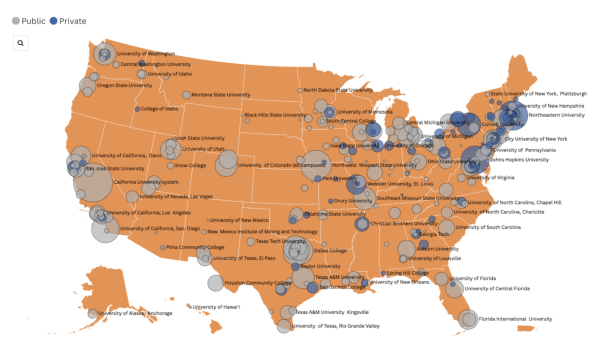International students in the U.S. face tightening restrictions on their immigration status. As of April 24, more than 280 colleges and universities had found more than 1,800 foreign students and recent graduates whose legal status had been changed by the State Department—and those numbers are increasing fast. The graph below shows the concentration of revoked visas around the country.

Many international students at Columbia University, New York, have lost their visas for participating in pro-Palestinian activities, such as protesting and/or writing articles.
Other new policies include the permission for Immigration and Customs Enforcement (ICE) to conduct enforcement actions, including arrests and searches on K-12 school grounds, hospitals, churches, and other public institutions.
Following this policy, being able to distinguish between public and private spaces became essential. ICE agents still require a judicial warrant signed by a judge to enter private property, such as a classroom or a student dorm. Students have the right to deny entrance to an agent if they don’t have the required documentation.
Despite this new enforcement power, individuals charged with deportation are still required to attend Immigration Court, or the part of the Department of Justice which handles cases regarding immigration law. However, the government’s administration has been developing restrictions on what makes an individual eligible to go to court.
Those who are subjected to “expedited removal”, for example, are currently not eligible to go to immigration court. Someone can be charged with expedited removal if they arrive at U.S. borders without valid documents, are caught at sea and brought to the U.S., were paroled into the U.S. after April 1, 1997, and then lost that status, or are caught anywhere in the U.S. within two years of entering without permission. There are also exceptions to expedited removal, and foreigners subject to it are afforded limited proceedings.
Immigrants are also being questioned more heavily at airports. Chicago’s O’Hare Airport has been very strict with questioning and rigorous procedures, while New York’s JFK Airport has, in comparison, been more lenient.
Students were cautioned that Customs and Border Protection has the right to search people’s electronic devices, with or without the traveler’s consent. The Official U.S. CBP website notes, however, that “In Fiscal Year (FY) 2024, less than 0.01 percent of arriving international travelers encountered by CBP at a port of entry had their electronic devices searched.”
In case an international traveler fears their device may contain information, especially in apps, that goes against the administrative policies, it is advised to them not to delete the apps. The analysis made by the CBP agents can inform these agents of the apps that were recently deleted, and travelers may be subject to explain why they deleted them.
What can international students do as safety precautions?
It is recommended that international students be prepared to answer questions regarding where they are staying and what they are doing in the United States. It is also recommended that they always have essential documents, such as the I-20 documents and F1 visa at hand, even if it’s just a picture.
Resources in Chicago were pointed out to students who might need assistance, including the National Immigrant Justice Center (NIJC) and the Indo-American Center (IAC). (Washington, D.C) Other services include the American Immigration Lawyers Association (AILA) and the Center for Legal Immigration Assistance (CLIA) (Lincoln, Nebraska).
For cases in which someone is taken into custody, it is recommended that friends and family get notified immediately. It is best that they find out where the person has been detained and get legal representation as soon as possible. In cases involving detainment for participation in protests or involvement in any activity against the current administration, challenging the constitutionality of the detainment in court may be applicable.